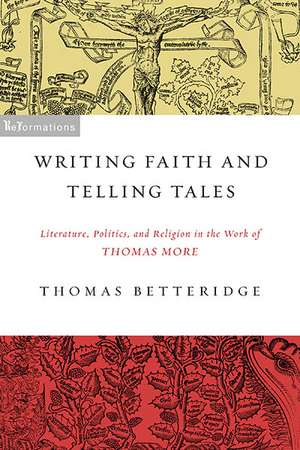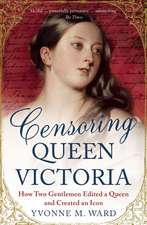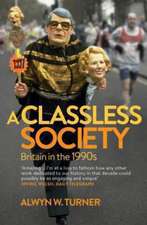Writing Faith and Telling Tales – Literature, Politics, and Religion in the Work of Thomas More: ReFormations: Medieval and Early Modern
Autor Thomas Betteridgeen Limba Engleză Paperback – 29 dec 2013
Din seria ReFormations: Medieval and Early Modern
-
 Preț: 290.14 lei
Preț: 290.14 lei -
 Preț: 312.54 lei
Preț: 312.54 lei -
 Preț: 426.89 lei
Preț: 426.89 lei -
 Preț: 297.71 lei
Preț: 297.71 lei -
 Preț: 279.44 lei
Preț: 279.44 lei -
 Preț: 300.58 lei
Preț: 300.58 lei -
 Preț: 288.56 lei
Preț: 288.56 lei -
 Preț: 301.56 lei
Preț: 301.56 lei -
 Preț: 285.94 lei
Preț: 285.94 lei -
 Preț: 272.55 lei
Preț: 272.55 lei -
 Preț: 298.67 lei
Preț: 298.67 lei -
 Preț: 329.67 lei
Preț: 329.67 lei -
 Preț: 331.80 lei
Preț: 331.80 lei -
 Preț: 350.29 lei
Preț: 350.29 lei -
 Preț: 323.53 lei
Preț: 323.53 lei -
 Preț: 362.32 lei
Preț: 362.32 lei -
 Preț: 351.72 lei
Preț: 351.72 lei -
 Preț: 350.36 lei
Preț: 350.36 lei -
 Preț: 349.42 lei
Preț: 349.42 lei -
 Preț: 389.21 lei
Preț: 389.21 lei - 23%
 Preț: 459.67 lei
Preț: 459.67 lei
Preț: 270.64 lei
Nou
Puncte Express: 406
Preț estimativ în valută:
51.79€ • 54.21$ • 42.85£
51.79€ • 54.21$ • 42.85£
Carte tipărită la comandă
Livrare economică 07-21 aprilie
Preluare comenzi: 021 569.72.76
Specificații
ISBN-13: 9780268022396
ISBN-10: 0268022399
Pagini: 270
Dimensiuni: 154 x 232 x 22 mm
Greutate: 0.43 kg
Ediția:1st Edition
Editura: MR – University of Notre Dame Press
Seria ReFormations: Medieval and Early Modern
ISBN-10: 0268022399
Pagini: 270
Dimensiuni: 154 x 232 x 22 mm
Greutate: 0.43 kg
Ediția:1st Edition
Editura: MR – University of Notre Dame Press
Seria ReFormations: Medieval and Early Modern
Recenzii
"Writing Faith and Telling Tales is an exciting study poised to resituate Thomas More as a late medieval thinker, revealing his as a corpus of work at odds not only with emergent Protestant writing and practices but with the confessional logic of the Reformation in general. Thomas Betteridge delivers a vivid and compelling picture of Thomas More, a picture that will act as a point of departure for future conversations on this interesting and important author. In addition, this study will serve as an influential survey of early Tudor genres and authors." —Russ Leo, Princeton University
"Writing Faith and Telling Tales challenges us to imagine a More for whom Chaucer, Langland, medieval tracts, and early drama were as important intellectual and spiritual landmarks as Erasmus and Martin Luther. Betteridge immerses himself in those texts and shares them with us, suggesting with insight, wit, and authority why we cannot understand More without them. The result is a quiet revolution, bringing nuance and subtlety to debates often polarised between advocates of a saintly or a fanatical, a ‘medieval’ or a ‘modern,' More. Betteridge’s More is no man for all seasons, but he shows emphatically why readers of all faiths and none in every era have found him so compelling." —Greg Walker, Regius Professor of Rhetoric and English Literature, University of Edinburgh
"A profound and distinguished contribution to Thomas More studies. Betteridge challenges us to put aside the simplistic lenses through which his subject’s life and writings are often viewed, and to look with fresh eyes at an individual whose evident complexity points not to psychological disarray, but rather to the vibrant and variegated character of the late medieval literary and religious cultures with which he was so fully engaged." —Peter Marshall, University of Warwick
“In scarcely two hundred pages, Betteridge attempts to weave together several generations of literature, exploring the English writings of Sir Thomas More (as well as the Latin Utopia) through comparison and contrast with over a dozen vernacular authors from the previous two centuries, including Chaucer, Langland, and Skelton. . . . Students of the English authors discussed here will take pleasure in the juxtaposition of familiar texts, while those who have known More through his engagement with Renaissance humanism will find that it enriches and deepens their understanding of the influences behind his work.” —The Medieval Review
“Thomas Betteridge critiques previous assessments of Sir Thomas More . . . as oversimplifying the complexity of More’s medieval heritage. . . . Betteridge reads primary texts closely, finding nuanced relationships between them and More’s work and his complex literary persona.” —Choice
“Presenting numerous examples of More’s own writings on philosophy, politics, theology, and the practices of affective faith, Betteridge places them alongside theological and literary texts, mostly in the vernacular English, from the late fourteenth and fifteenth centuries to demonstrate their cultural and religious continuity with those medieval works . . . Writing Faith and Telling Tales will be of interest to undergraduate and graduate university libraries, especially those concentrating on late medieval and early Renaissance English literature, and on sixteenth-century English political and ecclesial history.”—Catholic Library World
“What Betteridge has given us is something remarkably different, something both analytical and speculative that can be thoughtful, inquiring, and at times provocative. It is nothing short of an anatomy of More’s mind that manages to incorporate both the spiritual and the secular as it reaches toward an inclusive poetics of acculturated faith.” —Renaissance Quarterly
“There is much that is worthy of commendation in this new approach to the writings of Thomas More.” —The Heythrop Journal
“Writing Faith and Telling Tales argues that the writings of Thomas More should be read as part of ‘a tradition of late fourteenth- and early fifteenth-century vernacular literature.’ This tradition extends back to Chaucer’s Canterbury Tales, but includes other well-known texts such as Piers Plowman, as well as less-studied texts such as Reginald Pecock’s The Repressor of Over Much Blaming of the Clergy. Between a thirty-seven-page introduction and a fourteen-page conclusion, Betteridge offers four thematically organized chapters, respectively entitled ‘Politics,’ ‘Reason,’ ‘Heresy,’ and ‘Devotion.’” —Sixteenth Century Journal
“When Betteridge is at his best, his parallels are striking, and readers will be glad to have his suggestive run at More’s telling tales and striking arguments against the early English evangelicals . . . . Betteridge’s careful handling of More’s polemic works will be especially appreciated.” —The Catholic Historical Review
“This book covers a vast expanse of English vernacular writing, comparing More to Chaucer and Lydgate, to anti-Lollard tracts and plays such as Everyman, N-Town Play, and the Digby Mary Magdalene, devotional literature . . . . Writing Faith is a valuable addition to scholarship on More, written from a perspective that is rare in recent studies of his work.” —SHARP News
“In this fresh, thoughtful, and engaging study, Thomas Betteridge aims to free Thomas More from a weight of scholarship which has tended either to condemn him as a persecutor of heretics or revere him as a saint, and which has judged the significance of his literary output to be its contradictory position somewhere between the binary poles of the ‘medieval’ and the ‘modern.’ . . . Writing Faith and Telling Tales is an important and compelling book that not only enhances our understanding of More as an intellectual and writer but of the whole practice and meaning of writing, and not just in late medieval England.” —English Historical Review
“The achievements of Writing Faith are considerable. Betteridge has provided a much-needed complement to studies of More that emphasize the Continental aspects of his humanism, and he has also presented us with a version of More as a truly Literary writer, one whose investment in so many different genres derives equally from his varied philosophical commitments and from his abiding interest in storytelling.”—Renaissance and Reformation
“Thomas Betteridge’s desire to break down these [humanist writer, Lord Chancellor, and saintly martyr] divides in Writing Faith and Telling Tales is to be fulsomely lauded. . . His analysis of More often reveals intriguing insights, especially as to More’s view of the relationship between truth and fiction.” —Modern Philology
“Betteridge is largely successful in presenting an image of More that has taken into account the various intellectual influences in his life and appropriately fitting together the medieval and the humanist elements of More’s life and work.” —Medievalia et Humanistica
“Writing Faith and Telling Tales argues that the writings of Thomas More should be read as part of ‘a tradition of late fourteenth- and early fifteenth-century vernacular literature.’ This tradition extends back to Chaucer’s Canterbury Tales, but includes other well-known texts such as Piers Plowman, as well as less-studied texts such as Reginald Pecock’s The Repressor of Over Much Blaming of the Clergy. Between a thirty-seven-page introduction and a fourteen-page conclusion, Betteridge offers four thematically organized chapters, respectively entitled ‘Politics,’ ‘Reason,’ ‘Heresy,’ and ‘Devotion.’” —Sixteenth Century Journal
“When Betteridge is at his best, his parallels are striking, and readers will be glad to have his suggestive run at More’s telling tales and striking arguments against the early English evangelicals . . . . Betteridge’s careful handling of More’s polemic works will be especially appreciated.” —The Catholic Historical Review
“This book covers a vast expanse of English vernacular writing, comparing More to Chaucer and Lydgate, to anti-Lollard tracts and plays such as Everyman, N-Town Play, and the Digby Mary Magdalene, devotional literature . . . . Writing Faith is a valuable addition to scholarship on More, written from a perspective that is rare in recent studies of his work.” —SHARP News
“In this fresh, thoughtful, and engaging study, Thomas Betteridge aims to free Thomas More from a weight of scholarship which has tended either to condemn him as a persecutor of heretics or revere him as a saint, and which has judged the significance of his literary output to be its contradictory position somewhere between the binary poles of the ‘medieval’ and the ‘modern.’ . . . Writing Faith and Telling Tales is an important and compelling book that not only enhances our understanding of More as an intellectual and writer but of the whole practice and meaning of writing, and not just in late medieval England.” —English Historical Review
“The achievements of Writing Faith are considerable. Betteridge has provided a much-needed complement to studies of More that emphasize the Continental aspects of his humanism, and he has also presented us with a version of More as a truly Literary writer, one whose investment in so many different genres derives equally from his varied philosophical commitments and from his abiding interest in storytelling.”—Renaissance and Reformation
“Thomas Betteridge’s desire to break down these [humanist writer, Lord Chancellor, and saintly martyr] divides in Writing Faith and Telling Tales is to be fulsomely lauded. . . His analysis of More often reveals intriguing insights, especially as to More’s view of the relationship between truth and fiction.” —Modern Philology
“Betteridge is largely successful in presenting an image of More that has taken into account the various intellectual influences in his life and appropriately fitting together the medieval and the humanist elements of More’s life and work.” —Medievalia et Humanistica
Notă biografică
Thomas Betteridge is professor of theatre at Brunel University. He is the author of a number of books, including Literature and Politics in the English Reformation and Shakespearean Fantasy and Politics.
Descriere
Thomas More is a complex and controversial figure who has been regarded as both saint and persecutor, leading humanist and a representative of late medieval culture. His religious writings, with their stark and at times violent attacks on what More regarded as heresy, have been hotly debated. In Writing Faith and Telling Tales, Thomas Betteridge sets More's writings in a broad cultural and chronological context, compares them to important works of late fourteenth- and fifteenth-century vernacular theology, and makes a compelling argument for the revision of existing histories of Thomas More and his legacy.
Betteridge focuses on four areas of More's writings: politics, philosophy, theology, and devotion. He examines More's History of King Richard III as a work of both history and political theory. He discusses Utopia and the ways in which its treatment of reason reflects More's Christian humanism. By exploring three of More's lesser known works, The Supplication of Souls, The Confutation, and The Apology, Betteridge demonstrates that More positioned his understanding of heresy within and against a long tradition of English anti-heretical writing, as represented in the works of Hoccleve, Lydgate, and Love. Finally, Betteridge focuses on two key concepts for understanding More's late devotional works: prayer and the book of Christ. In both cases, Betteridge claims, More seeks to develop a distinctive position that combines late medieval devotionalism with an Augustinian emphasis on the ethics of writing and reading. Writing Faith and Telling Tales poses important questions concerning periodization and confessionalization and will influence future work on the English Reformation and humanist writing in England.
"Writing Faith and Telling Tales is an exciting study poised to resituate Thomas More as a late medieval thinker, revealing his as a corpus of work at odds not only with emergent Protestant writing and practices but with the confessional logic of the Reformation in general. Thomas Betteridge delivers a vivid and compelling picture of Thomas More, a picture that will act as a point of departure for future conversations on this interesting and important author. In addition, this study will serve as an influential survey of early Tudor genres and authors." —Russ Leo, Princeton University











